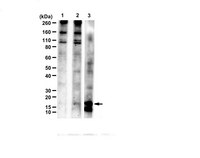ABN1360 Sigma-AldrichAnti-C9ORF72 (α-GR sense Antibody, CT)
Anti-C9ORF72 (alpha-GR sense, CT), Cat. No. ABN1360, is a highly specific rabbit polyclonal antibody that targets C9ORF72(alpha-GR sense, CT) and has been tested in Dot Blot, Immunocytochemistry, Immunofluorescence, Immunohistochemistry, and Western Blotting.
More>> Anti-C9ORF72 (alpha-GR sense, CT), Cat. No. ABN1360, is a highly specific rabbit polyclonal antibody that targets C9ORF72(alpha-GR sense, CT) and has been tested in Dot Blot, Immunocytochemistry, Immunofluorescence, Immunohistochemistry, and Western Blotting. Less<<Recommended Products
Přehled
| Replacement Information |
|---|
| References |
|---|
| Product Information | |
|---|---|
| Format | Serum |
| Presentation | Rabbit polyclonal antiserum with 0.05% sodium azide. |
| Quality Level | MQ100 |
| Physicochemical Information |
|---|
| Dimensions |
|---|
| Materials Information |
|---|
| Toxicological Information |
|---|
| Safety Information according to GHS |
|---|
| Safety Information |
|---|
| Packaging Information | |
|---|---|
| Material Size | 100 µL |
| Transport Information |
|---|
| Supplemental Information |
|---|
| Specifications |
|---|
| Global Trade Item Number | |
|---|---|
| Katalogové číslo | GTIN |
| ABN1360 | 04054839251214 |
Documentation
Anti-C9ORF72 (α-GR sense Antibody, CT) Certificates of Analysis
| Title | Lot Number |
|---|---|
| Anti-C9ORF72 (α-GR sense, CT) - 4229385 | 4229385 |
| Anti-C9ORF72 (α-GR sense, CT) Polyclonal Antibody | Q2883598 |








